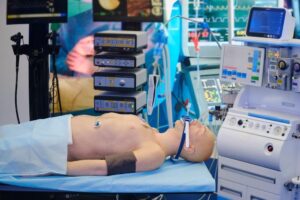What to REALLY Look for When Hiring a Sim Tech
What question do you think is more important for a Simulation Technician to be able to answer immediately?
- A) “What does a sudden drop in blood pressure indicate in a geriatric case?”
- B) “Why is the microphone not working and the computer making that beeping noise?”
Before you answer let me propose one more question to you… Wouldn’t most of your coworkers be able to immediately answer Question A over Question B? So how many more cooks do we need in that kitchen?
Designing a job description and finding the right Sim Tech is much easier when you can identify the skill sets lacking in your Sim Lab. Let’s take a look at some of the qualities of a Healthy Simulation Technician.
Sponsored Content:
As a bridge between technology and faculty, Simulation Technicians are crucial to a successful simulation program. Simulation Technicians are primarily responsible for integrating, maintaining and operating the computer and audio/video (A/V) technology including the manikin and surrounding equipment. For a comprehensive list of job duties, check out the California State Regional Health Occupations Resource Center’s (RHORC) sponsored job description for the responsibilities and skills of a Simulation Technician).
While that document provides a great intro, here are some crucial ideas to really consider when hiring a Sim Tech:
1) A healthcare background is nice, but may not be necessary.
Over the past two years I have spoken to dozens of nursing departments looking to hire a simulation technician for their labs. I am always surprised to learn when these groups require applicants to be a registered nurse. I remind them to consider that they already have plenty of faculty who understood the nursing process, but what they didn’t have was someone with years of advanced computer hardware, programming, and A/V experience. Stretching their team to include a team member with a completely different set of skills, especially ones that their department was critically lacking, would expand the whole department’s ability to utilize simulation.
Sponsored Content:
While obviously it helps to hire someone with some medical experience, a basic understanding of body physiology and pharmacology can suffice to get a new simulation technician integrated into the healthcare field. Of course they will need some training, but consider that a candidate who is open and eager to learn new things can far exceed the potential of someone with years of healthcare experience, (especially one who “knows it all” already).
Ultimately, if you are creating a position of a standalone Simulation Technician, then you are really looking for someone to manage the technology. And if you have hired the right technician and your partnership is working out, you can always invest in their education by asking them to attend an online EMT course.
2) Ability to communicate over lengthy computer experience
Not all IT technicians are ‘people-persons’. I know lots of guys that have years more experience with a computer and put me to shame with their programming knowledge. Yet when it comes to simple, polite, and friendly workplace conversation they couldn’t talk their way out of a paper bag. Unlike IT folks who live in some dark cave of their own department, Simulation Technicians work directly with faculty, staff, and learners on a daily basis. Thus I truly believe it is crucial that the person you hire is someone who will be able to cooperate and communicate with a team. Experience in areas like education, direct customer satisfaction, or even non-IT related jobs in an office or production environment are all pluses.
Remember, a commitment to a strong and healthy simulation program means a commitment to making your Simulation Technician an integral part of the development and operations of your lab. Design your technician position for a person that “proactively aids faculty with simulation development” as opposed to just “fixes the broken computer”. Then your job description and hiring committee will have a better understanding about the type of individual your lab is looking for.
3) Ability to tell a story through production experience
This takes the Simulation Technician’s ability to communicate one step further by requesting the individual understand the dynamics of “story telling”. I think of scenarios as little stories (or scenes) about to unfold for your learner. Like planning and setting up a surprise birthday party, all the pieces of the puzzle must be carefully crafted and carried out to ensure a success. Simulation is somewhat like a surprise party for the learner. Your Sim Tech should be an individual who understands the importance of “setting the scene” for the learner.
Because of this I highly recommend individuals with film-making experience for Simulation Technician positions (this includes audio producers). Film-makers know that to get a message or feeling across to the audience, they must plan out and capture the background, dialogue, camera angle, sound, editing tempo, props, and wardrobe to convey the necessary images to create that message. The more detail in those elements the better the message will come across. And the same goes for your Simulation experience. The more time spent preplanning and setting up a scenario to reflect every last detail, the more immersive and intoxicating the moment to ‘buy-in’ will become for your learners. This includes details in areas that are normally run by the technician, like programming, moulage, props, and supplies.
To follow those lines, a person experienced with the craft of audio/video production will remember to look out for silly things like the boom microphone getting caught in the shot. Again, experience with production means an individual understands the effort involved with capturing a scene as close to the imagined script as possible, just like simulation!
So how can you tell if someone has A/V experience?
Well in this digital age, a person who can craft an edited youtube video must have at least a basic understanding of video production. (Edited meaning that different scenes or camera angles were put together to look seamless). Such a web video would require knowledge of digital camcorders, digitizing footage into a computer, software manipulation, compression formatting, exporting media files, and distribution mediums. If you have a resume of an individual with audio or video production experience, ask if they have a project they would like to share with the interview panel.
Lastly, remember that someone with an A/V skill-set can help produce lab orientation and promotional videos. Access to this ability is crucial in the development of every simulation program.
Measure Twice, Cut Once
Consider your Sim Tech job posting carefully. Try to fill in the skill-set gaps that currently challenge your department the most; meaning digital hardware and software experience may need to have a priority over a healthcare background. With the right person, you can create a partnership among the faculty and the simulation technician to teach and stretch one another’s abilities. You are looking for an individual who loves to work with technology, but remember they also need to explain and share that technology with technophobes. So a candidate with less technical experience but with a demonstrated ability to communicate may need to be weighted more. Lastly, A/V experience in a Sim Tech is highly beneficial as A/V equipment is just way more finicky than computer equipment. Understand that most individuals who know A/V technology also know computer equipment, but that is not always true vice versa.
Post a comment with any questions!
Lance Baily, BA, EMT-B, is the Founder & CEO of HealthySimulation.com, which he started while serving as the Director of the Nevada System of Higher Education’s Clinical Simulation Center of Las Vegas back in 2010. Lance is also the Founder and acting Advisor to the Board of SimGHOSTS.org, the world’s only non-profit organization dedicated to supporting professionals operating healthcare simulation technologies. His co-edited Book: “Comprehensive Healthcare Simulation: Operations, Technology, and Innovative Practice” is cited as a key source for professional certification in the industry. Lance’s background also includes serving as a Simulation Technology Specialist for the LA Community College District, EMS fire fighting, Hollywood movie production, rescue diving, and global travel. He and his wife Abigail Baily, PhD live in Las Vegas, Nevada with their two amazing daughters.
Sponsored Content:




















